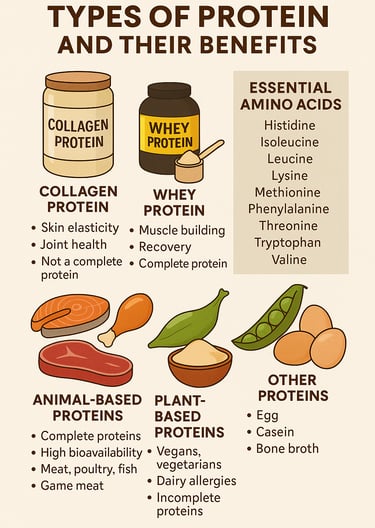What is Protein?
PROTEIN
7/26/20253 min read
The Different Types of Protein and What They’re Good For
A Complete Guide to Protein Sources, Amino Acids, and Which to Choose
Whether you're building muscle, healing from injury, or just trying to stay healthy, protein is one of the most important nutrients in your diet. But not all protein is the same. From fast-absorbing whey to skin-repairing collagen and plant-powered blends, each protein source has its own role to play.
In this guide, we’ll break down:
What makes a protein complete
The 20 amino acids your body needs
Animal vs plant vs specialty protein types
What different sources are best for


🧬 What Is a Complete Protein?
Proteins are made up of amino acids—the building blocks of muscle, skin, enzymes, neurotransmitters, and more. Out of 20 total amino acids, 9 are essential, meaning your body cannot make them—you have to get them from food or supplements.
A complete protein contains all 9 essential amino acids in the right proportions.
🧪 The 20 Amino Acids
🔹 9 Essential Amino Acids (must get from diet):
Histidine
Isoleucine (BCAA)
Leucine (BCAA)
Lysine
Methionine
Phenylalanine
Threonine
Tryptophan
Valine (BCAA)
🔸 11 Non-Essential Amino Acids (your body can make them):
Alanine
Arginine (semi-essential during growth or illness)
Asparagine
Aspartic acid
Cysteine (synthesized from methionine)
Glutamic acid
Glutamine (conditionally essential under stress)
Glycine
Proline
Serine
Tyrosine (made from phenylalanine)
🥩 Animal-Based Proteins (Meat, Poultry, Fish)
Animal proteins are complete proteins and typically have high bioavailability, meaning your body absorbs and uses them efficiently.
🔸 Beef Protein Isolate
What it is: Not just ground beef! It’s made by hydrolyzing beef (often from lean cuts or collagen-rich parts like hide and connective tissue), then filtering it into a powdered form.
Benefits: High in collagen amino acids like glycine and proline, along with creatine and iron. Great for muscle repair, skin/joint health, and post-injury recovery.
Drawbacks: Often low in tryptophan, so some blends are not 100% complete unless combined with other sources.
🔸 Chicken and Turkey Protein
What it is: Whole poultry meat or isolate powders from chicken breast.
Benefits: Lean, complete protein with a high ratio of leucine for muscle growth. Low in fat and easy to digest.
Best for: Clean bulking, cutting, and maintaining muscle without excess calories.
🔸 Fish Protein (Salmon, Tuna, Whitefish)
What it is: Whole fish meat or hydrolyzed fish protein powder.
Benefits: Complete protein with added omega-3 fatty acids (especially in salmon), supporting anti-inflammation, brain health, and fat metabolism.
Best for: Cutting, cardiovascular health, and joint recovery.
🔸 Game Meat (Venison, Elk, Bison)
What it is: Naturally lean meats with high protein content, often pasture-raised.
Benefits: Complete protein, low in fat, rich in iron, B12, and zinc.
Best for: Paleo diets, testosterone support, high-protein low-fat plans
🧴 Collagen Protein
What it is: Extracted from animal connective tissue (beef hide, chicken cartilage, fish skin).
Amino acids: High in glycine, proline, hydroxyproline — NOT a complete protein.
Benefits: Skin elasticity, hair growth, joint repair, gut lining support
Best used as: A complementary protein, not a main source for muscle building
💪 Whey Protein
What it is: Extracted from milk during cheese production
Types: Whey Isolate (low in lactose), Concentrate, Hydrolysate (pre-digested for fast absorption)
Why it’s great: Complete protein, high in leucine, fast absorption
Best for: Muscle growth, recovery, lean mass maintenance
🌿 Plant-Based Proteins
⚠️ Most are incomplete, but combinations can make them complete.
Plant ProteinComplete?NotesPea❌Low in methionineRice❌Low in lysineHemp✅Lower in lysine, but broad spectrumQuinoa✅Rare complete plant proteinSoy✅Complete, but can be allergenicPumpkin Seed❌Combine with others for full profile
Best combos:
Pea + Rice = complete
Hemp + Pumpkin + Chia = balanced spectrum
Best for: Vegans, people with dairy/lactose issues, sustainability
🥚 Other Notable Protein Types
🥚 Egg White Protein
Complete, high bioavailability
Lactose-free, great for muscle growth
Ideal for cutting phases
🐄 Casein Protein
Slow-digesting milk protein
Best for overnight recovery and satiety
Great for preventing muscle breakdown during fasting
🍲 Bone Broth Protein
Similar to collagen but includes minerals, gelatin
Gut health, joint support, immune support
Not a complete protein
⚖️ Which Protein Should You Use?
GoalRecommended ProteinBuild lean muscle fastWhey Isolate, Egg White, Beef IsolateJoint/skin healthCollagen, Bone BrothFat loss/cuttingCasein, Chicken, FishVegan strengthPea + Rice blend, Soy, QuinoaGut recoveryBone Broth, Collagen, GlutaminePaleo/carnivore dietVenison, Bison, Beef Isolate
🧠 Final Takeaway
Protein is more than just fuel for gains — it’s critical for every cell in your body. The best results come from choosing the right protein for the right goal:
Want muscle? Go complete and fast-digesting.
Want skin, joints, or gut support? Go collagen-rich.
Plant-based? Combine sources to fill in amino gaps.
Mix and match smartly. Just because one source isn’t “complete” doesn’t mean it’s not valuable — it just means it works best alongside others.
Your go-to source for supplement insights and advice.
Sign up to recieve newest blogs and newsletters
© 2025. All rights reserved.
